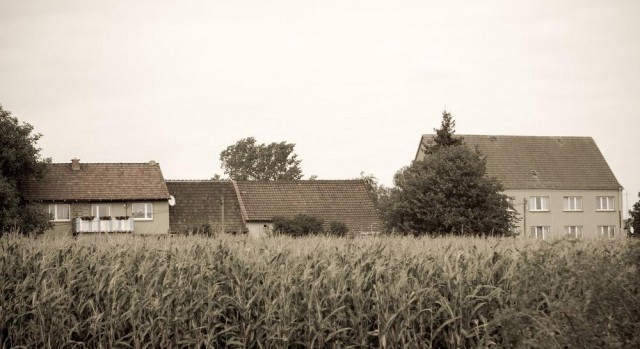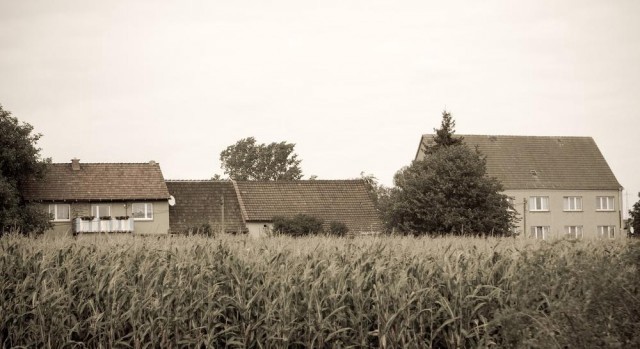You Are No Longer a Father to Me
by Sarah Dee


I was 16 when I went on my father’s computer and found a significant amount of child pornography. I ran outside in shock and vomited over and over onto the lawn as a tepid rainbow arced above the cornfields in the watery Kansas sky.
Minutes earlier, I’d been in his office in front of the desktop computer, scanning his browser history, clicking his bookmarks. I don’t know what I was searching for — evidence of an affair, maybe, or just run-of-the-mill porn, which was taboo enough at the time, in the place. But I’d had premonitions. Already, I wasn’t comfortable being alone with him. My skin crawled if he put his hand on my shoulder, and I locked my bedroom door at night.
Until that point I had refrained from approaching the question of what exactly these premonitions implied. I was a young 16, sheltered and naïve from my conservative Christian upbringing, an introverted child in an insular family in a remote Kansas town where we attended church three times weekly and morality contained no gray. I was suffocating in this environment; my veins seemed to compress. But I was wildly sensitive to guilt and I felt terrible for even suspecting my father of anything. I prayed nightly for forgiveness even as I continued locking the door.
That day I found online galleries and photographs of teenage and prepubescent girls. I found archived fictional stories that jolted me even more. As someone who spent hours a day in a book or at my keyboard, I knew the power of stories, and these were graphic ones: of dads molesting and raping their young daughters.
•••
My dad had an oversized presence in our family of four. A man who I only later recognized was deeply insecure, he demanded deference from anyone he considered below him: his employees and customers, staff at restaurants and stores, and of course, his wife and two daughters. He could be jovial and animated, with a smart sense of humor. But at any perceived slight, usually imagined, he’d explode into anger. I was often the source of those slights, and I had recently discovered that staring coolly back at him while he rebuked me made him frantic with rage at my lack of reaction. It was a cycle that fed itself until we were fighting almost nightly, and the bitterness between us grew.
He worked hard at the small construction business he owned. He had a restless, ceaseless energy and was audible wherever he was in the house, slamming cabinets and drawers, making phone calls at scream volume, whistling tunelessly through his teeth. The only time we couldn’t hear him was when he closed the door to his office, which he had begun doing more and more often. When I decided I wanted more justification for my bitterness toward him, it was easy to conclude that behind that closed door was a good place to start looking.
After I found the porn on his computer, the question continued to haunt me: what was this knowledge confirming? I had always known something, in some small and subconscious way, but why? I searched my memories gingerly, like someone investigating a noise at night, terrified of actually discovering something but propelled to keep looking regardless. Years later, I have found no evidence other than the suspicion itself.
I was left with the problem of what to do. If my father had taken the pictures himself, it would have been a clear-cut matter of going to the police. But, while viewing photos online was certainly a perversion, was it a crime? Fictional stories were even less actionable. I thought of publicly exposing him by going to the church elders, but then my mom and sister would find out.
I thought that telling my mother would destroy her. She had recently begun medication for depression, and she suffered from chronic pain and other mysterious and debilitating symptoms that would be later diagnosed as an autoimmune disease. Her husband had given her stability, a beautiful home, and two daughters, but he also gave her an unending stream of criticism and ridicule.
Would she be better off without him? I wondered. But that was assuming she would ever leave. We were taught that the Bible only condoned divorce when the other partner had cheated. “I’m the only one in the world who could put up with him,” she would say, not flippantly — she did firmly believe God paired her with him for her attribute of tolerance, choosing her for the cross of her wifely duties and blessing her with a heavenly reward. She wouldn’t leave.
I felt, too, like I couldn’t tell my older sister. She had left for college earlier that year, and I was jealous of her escape. But I couldn’t see any benefit to her feeling the same betrayal I did. She is sensitive and compassionate; people have always wanted to shield her from the world’s realities, and I felt the same way even as I resented her for being older than me but more naive.
In the end, I left it up to my dad. Returning to his computer a few weeks later, I deleted all the links and photos, scouring his bookmarks clean and even deleting photos he had taken of my friends and I swimming in our pond one recent summer afternoon. Then I waited.
I didn’t have to wait long. That evening my mom came down to my bedroom and knocked on my door. “Were you using dad’s computer?” she asked. I steeled myself and then said that I was.
“He’s mad because he thinks you deleted some of his files,” she said. “From now on, just use the basement computer when you need one.”
I was shocked, and then crushed. Not only was he unrepentant, but he was actually insinuating I was in the wrong for invading his computer. Still, I could not bring myself to approach him. I didn’t have the words to express what I felt. And I couldn’t demand an apology from him because I was in no way ready to forgive. Instead, I wrote seething letters that I hid away undelivered: “How long has this been going on? How long have I unknowingly trusted a pervert? I will never make that mistake again, with you or anyone else. You are no longer a father to me.”
The next three years I swamped my life with friends and activities so that I would be home as little as possible until my own escape to college. My father and I kept our distance from each other, rarely interacting. Eventually the day arrived when I packed up my car and drove the eight hours to my new dorm home, where I was finally able to exhale.
•••
Like most people, I changed during college. I discovered alcohol and at times over-relied on it. I wrestled with and discarded many of my convictions about sin, sexuality, and hell. After college, I moved farther away and cultivated a life where everything had a space with boundaries and nothing overflowed. In that way, I could dissect people neatly out of my life if they wronged me. I traveled to far-away countries and delved into cultures I had never even imagined in my hometown. In one dark year, I pushed the edges of my capacity to hurt myself until the stronger and weaker parts of me united in a firm “Enough.” I emerged in time to meet a wonderful man who stilled something inside of me that I didn’t know was raging. Together, we moved away even farther.
I was able to largely forget about my father and the world I had left behind. On visits to home, I had a few moments when I’d soften toward him. I’d see his eagerness to entertain, always buying the latest toys and gadgets to show off to guests. I’d notice his sharp sense of humor, remember capability and drive to provide for his family. I’d hear stories that humanized him, like when he was forced to make arrangements for his mother’s funeral as a young man of only 18 years old. I would see traits of him in myself: my impatience, my inability to tolerate ignorance.
More importantly, he seemed to have slowly changed over the years. As his business stabilized, his irritability softened. He became more attentive, less critical toward my mother and more involved in church. Once, on a call with my mother, the conversation turned to him. “He told me the other night that he regrets being a bad father to you,” she said, her voice puzzled across the distance.
I kept my mouth shut — a habit deeply ingrained by then — but the comment felt like a stone, smooth and hard, lodged in my chest. I knew I would never again run into his arms, but forgiveness no longer seemed fully out of reach. I wondered how much I could judge him for impulses never acted upon. Could I hate the pervert but still love my father?
Then my sister announced her pregnancy with her first daughter. I pictured the little girls in the photos and stories and felt wracked with fear: that he hadn’t changed, that he was capable of acting on these imagined scenarios, that the extra layer of familial distance might embolden him.
I had no choice; I told my sister. On a long evening drive during a visit home, we cried together as she tried to accept that our father could be a threat to her child. I felt that I had doubled the burden rather than halved it, but as we talked about how she’d deal with this, I took comfort in the vow that his damaging instincts would never spread beyond the two of us.
I often feel ashamed for just the existence of my pain, which is nothing compared to the hurt inflicted by parents who’ve beaten, molested and raped their children. But still I mourn for the girl I was, standing in her yard surrounded by cornfields, filled with disgust and fear and an impenetrable loneliness. I want to reach out to her and stop her from making the mistakes I know she’ll walk into.
•••
Recently my parents came to visit me for the first time at my apartment in New York City. They’ve never been overseas, and New York was by far the biggest culture shock they’ve experienced. I’d always seen my father as a capable, towering figure, but when I met them at the airport I noticed his gray hair and hunched frame. As we waited at the baggage claim, my mother said he had been white-knuckled throughout the flight’s turbulence.
Touring the city, I tried to demystify the subway system so they’d be able to explore while I was at work the next day. My mother, so accustomed to depending on my father to make her decisions, didn’t even listen. My father was bewildered by the many numbers, colors, and transfers. When we rode in a subway car that had the wrong line showing on the display map, he threw up his hands in exasperation, insisting that there was no possible way of understanding how to get around. Out of context, he was dependent on me.
That day I saw us clearly: an old man, overwhelmed by a subway map, and his adult daughter, finally at ease.
Sarah Dee lives and writes in New York, where she only occasionally gets lost.
Photo via Marcus Crafter/flickr